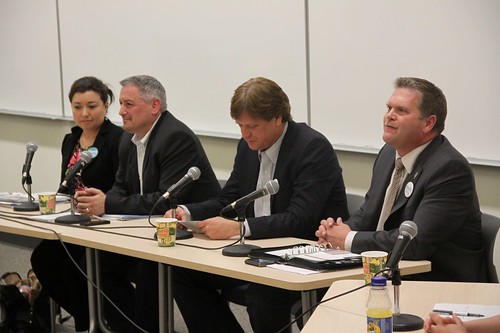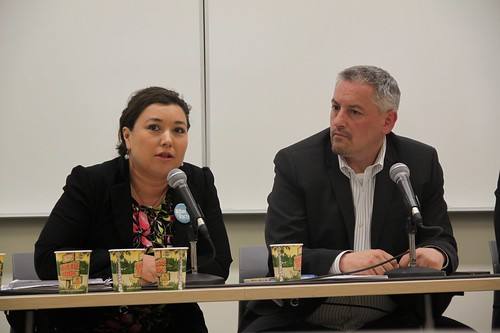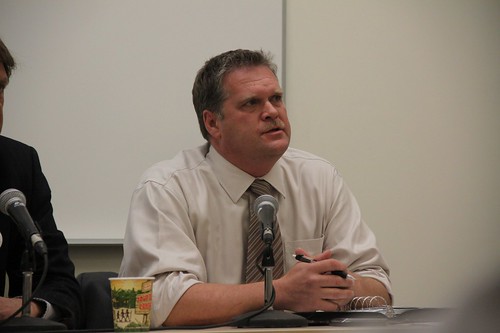
A small crowd of around 80 interested Edmontonians gathered to hear the candidates seeking the leadership of the Alberta Party this week at MacEwan University in downtown Edmonton. It is a low-key contest that will culminate this weekend at a leadership convention at Edmonton’s Shaw Conference Centre. The forum could be described as tame and respectful, and the absence of major policy differences between the candidates meant that the audience had an opportunity to observe the differing leadership styles of the candidates.
Tammy Maloney stressed her experience as a social entrepreneur, as a past director of the Clinton Foundation in Nigeria, and as connecter. Ms. Maloney has the biggest heart of the four candidates in this contest, and she is driven by it.

Lee Easton was the most articulate of the candidates. The Mount Royal University English Professor speaks in an articulate and perfunctory tone about the challenges facing our province and what needs to change. He has some of the same characteristics of what I like about former Liberal leader Kevin Taft, but in the same breath I wonder about his ability to promote the party in non-academic language. I wonder if he can successfully play the game of retail politics.

Randy Royer needs to work on his elevator pitch. His introduction focused on his experiences as a Liberal Party of Canada member in the 1980s and having dinner with Prime Minister Pierre Trudeau, where he told the audience he advocated against Ottawa’s policies that hurt Canada’s western provinces. Over the course of the evening, only one thing became clear to me: that he would not be getting my vote.

Glenn Taylor appears to be the clear front-runner in this contest. Mayor Taylor is a retail politician and is the only candidate in this race with actual governing experience, having been elected three times as Mayor of Hinton. Over the past week Alberta Party activists like Chima Nkemdirim, Michael Brechtel, and Don Schurman have piled their endorsements behind Mayor Taylor. Experience has taught me to be cautious of candidates who receive too much support from party intelligentsia.
Mayor Taylor is also the only candidate in this contest not from Calgary, and if selected as leader would be expected to run as a candidate in the West Yellowhead constituency.
The candidates answered at least twenty questions from a panel and the audience. The most pointed question of the evening came from an audience member who asked about the challenge of articulating how the Alberta Party is developing its policy and the perception that it is just another populist political party.
The candidates struggled to answer this question.
The short answer is that the process is very focused on sharing ideas.

The longer answer is that The Big Listen process, which is how the party has been developing its policy positions, starts with a series of small meetings (usually held over coffee or in a living room) where participants are encouraged to share their stories, hopes, and aspirations for Alberta. The information collected from these Big Listens is then discerned into themes by the meeting organizers and passed on to an issue-specific policy team that summarizes the collected feedback, does research, and develops policies. The members of the issue-specific policy committees are people with backgrounds in those fields, be it professional, educational, or voluntary. The policy recommendations are then put to the membership for approval. At a policy convention or by using online tools, members are able to view the policy goals, contribute their input, and provide support for the policy goals. It is very process focused and driven by values and principles that the party was founded upon.
The leadership forum reminded me why I dislike the personality politics of leadership races and the cult of personality that perennially envelops partisans. There are politicians that I like, and have put my support behind. I had the pleasure of working with Kevin Taft when he was leader of the Liberal Party and I have enjoyed volunteering for Councillor Don Iveson‘s campaigns at the municipal level in Edmonton. While all the candidates seem to be nice people, some who would also do a decent job as leader, there is no candidate in this contest that I am excited about.
For many Alberta Party members I have spoken with, the leadership question has been almost an afterthought, with members instead focused on building policy and constituency organizations across the province.
As was wisely pointed out in an editorial in this week’s final edition of SEE Magazine
“the PCs and Alberta Liberals are leader-dominated parties, where the party’s identity is closely associated with the leader. The Alberta Party won’t be going that route, either by design or by default.”
Whether by design or by default, the Alberta Party’s low-profile leadership contest is not as crowded as the PC leadership race or oddly casted as the Liberal leadership.
In a political environment where a party leader almost always overshadows their team as the centre of attention (walk down the street and ask a random person how many MLAs they can name), it will be interesting to see whether the Alberta Party can break the growing trend towards the cult of leadership personality. Perhaps that is why, in spite of my general frustration with political parties, I have remained a member of the Alberta Party.
With only 2000 memberships sold in this leadership contest, the Alberta Party has both proven how far it has gone in the past year and how much work still lies ahead for its members and, after this weekend, new leader.

15 replies on “by design or by default, a low-key alberta party leadership race.”
Great, really objective piece Dave.
“With only 2000 memberships sold in this leadership contest, the Alberta Party has both proven how far it has gone in the past year and how much work still lies ahead for its members and, after this weekend, new leader.”
You’re the first person affiliated to the party that I know of that’s included a qualifier like “only”. 2000 members is a milestone for the AB Party, no doubt; but I personally found it to be very surprisingly small number at the completion of a leadership race. Ah well, I’m going to shup up now given that my own party’s now in the business of selling memberships during a leadership race and I don’t want to attrack bad political karma.
But good piece.
While to some extent I share your concerns about the whole concept of leadership politics and the politics of personality, leadership remains important for a number of reasons.
Firstly, from a parliamentary perspective, if the Alberta Party were ever to either form Government or become the Official Opposition, the party leader would then become Premier or Opposition Leader, with all the implications that status carries. Back in the the inter-war years, the United Farmers of Alberta won Government in 1921, but did not have a party leader to enter the Premiership; they had to go outside the legislative assembly to recruit a Premier. In today’s political world, this would never fly.
Secondly, today’s media rely on the leader for the “sound bites” that are the core of modern political reporting. No leader, or an ineffective leader, means no quotes and no coverage. Decry it we may, and many do, but that is the reality of political journalism today. This has been one of Stelmach’s major weaknesses as Tory leader: his total ineffectuality as a public speaker, which is a core skill for a politician.
Thirdly, the leader ensures party discipline and respect for the very grassroots policy development process the AP is touting. If a caucus member, critic or minister goes “off the reservation” (apologies for politically incorrect phraseology), the leader is the one who must enforce party discipline and bring that person back onside.
I am not an AP supporter, and in fact I feel that their efforts would have been better spent influencing the policies of the existing progressive parties, but looking dispassionately at the process, I think a weak leadership process and a weak leader are likely to doom this new party’s fortunes.
Great, really objective piece Dave.
“With only 2000 memberships sold in this leadership contest, the Alberta Party has both proven how far it has gone in the past year and how much work still lies ahead for its members and, after this weekend, new leader.”
You’re the first person affiliated to the party that I know of that’s included a qualifier like “only”. 2000 members is a milestone for the AB Party, no doubt; but I personally found it to be a very surprisingly small number at the completion of a leadership race. Ah well, I’m going to shup up now given that my own party’s now in the business of selling memberships during a leadership race and I don’t want to attract bad political karma.
But good piece.
Good post Dave.
I went into the evening assuming I would end up supporting Glenn Taylor, mostly because of his NDP past and his time as Mayor of Hinton. However I found him to be way too intense as a public speaker. He seemed angry about every single line he delivered, and his answers avoided the questions and were littered with vague platitudes and goofy “catch phrases” he was obviously trying to force into his responses.
I came away from the evening feeling Tammy M and Lee E had the most raw potential, but either of them would need a lot of work on their public speaking skills.
Not sure where my support will land except to say that it won’t be with Glenn Taylor. And I’m not sure what the point of a leadership campaign devoid of policy differences is. Are AB Party members supposed to pick a leader based on oratory skills alone? Or who looks the nicest? Because without specific platforms, each of these candidates felt very lacking.
Some great points have been made. I don’t personally think that the party leader should be putting forward policy, especially in the Alberta Party, but that seems to leave only process by which to differentiate the candidates. If I’ve learned one thing from my very brief experience in watching politics, it’s that voters don’t get excited about process.
And I’m not sure about Dave’s description of policy development. I’ve been able to watch the development of the education policy, and I’m not sure how much of it filtered up from the Big Listens. It became a very small group of people, a handful really, who put in it what they believed would be best. Kinda sorta grassroots, I guess. And with all of that policy ready (I assume), won’t we see it until the next policy convention in November? That’s a long time to be a party without a platform.
For all its talk about doing politics differently, the Alberta Party has failed, in my mind, to answer Robert’s question. Or at least, to answer it in a new way: What is the relationship between the leader, the candidates, the caucus, the party, the constituencies, etc.? Who is responsible for what? When they disagree about something, who wins?
They seem to have gone forward with the assumption that they can do politics differently without saying “how”.
I have found the leadership race underwhelming, too.
Good post.
2000 memberships sold is actually a fairly impressive number. If 1000-1500 vote, that would put the ABParty at about 25%-30% of the votes in the last ABLib race, which is more than I’d expected.
At the same time, like it or not, politics is very much leader-driven (look at the last federal election for proof of this). I haven’t studied the candidates closely, but none of them really strike me as being able to catch the eye of the media and Albertans.
Nice piece Dave.
The chief narrative coming from observers of this race, both in the media/blogs and in other parties, has been how generally underwhelming the whole thing is. We didn’t get our Daniel Smith, we “only” sold 2000 (actually 2100!) memberships, etc, and this has ominous implications for the future party.
I guess my reaction to this is that people truly don’t understand how much work it takes to build a party. Not that they should, and not that that will mean anything to the voters we have to face in 4-12 months, but I think it would change their perspective. We basically started from scratch a year and a half ago, and 18 months later we have 2100 members and four accomplished, serious people who believe in our party enough to put their career on hold to help build it.
I’m really happy about this. Sure, I would have loved to have a more high profile race, and not having a more high profile race is going to make it more difficult to win seats come the next election, but all-in-all I’m extremely proud of what we’ve been able to accomplish such a small amount of time, and I’m optimistic for what the future holds. Although maybe not as fast as we like or as other people expect we should be, we’re still moving in the right direction: up. I’ll be worried when that stops being the case.
Dave,
Great post and I agree with you on many points that you made.
For me, the Alberta Party has come a long way from when I first joined the Board of Directors in June 2009. Back then there was about fifty members, no leader and no direction.
In under two years the Alberta Party is having a leadership race with more that one candidate, sitting just over 2000 members (unkown as to how many supporters as you do not need a memebership to be invloved with the Party), Constituency Associations being created all over Alberta and most importantly getting people talking and being involved in politics. All done on a low profile.
I look forward to having a full time leader elected by the membership this weekend and focusing more energy on building a better political party for all Albertans to consider.
In response to jerrymacgp, your description of a leader’s role in enforcing party discipline is my main beef with party politics these days.
Parties these days are quite intolerant of any dissent at all, to the detriment of Canadian citizens. Talk to a politician privately and you’ll realize they have a diversity of views. Viewed publicly, you come to the conclusion they’ve succumbed to groupthink. If they’d like to keep their position as cabinet minister or seat on committees, etc, they’d better toe the line.
Political parties aren’t particularly democratic these days, more resembling authoritarian regimes than anything else. I’d like to see our province (federally too) go the way of the non-partisan Nunavut legislature. That would be a good start.
The truth is that the purpose of a political party is to run in elections, get members elected, win and form government. While I like the centrist nature of the AB Party and a lot of the philosophies behind it, it just doesn’t look like it wants to win. Danielle Smith and the Wild Rose Alliance want to win. But anyone on the Progressive side would rather talk about what makes good policy rather than combining it together in a vision and presenting it as a choice for voters. As long as the conservative side dominates with its vision, we will be stuck with conservative governments.
Career politicians no longer run the show. Technology will enable the electorate in ways that seemed unimaginable a generation ago. The Alberta Party is positioned to lead that vanguard.
[…] party without the need to resort to a second ballot. It helped that Taylor appears to have had the backing of the new party’s principal movers and […]
[…] and I attended as a member from the Edmonton-Centre constituency. Despite my reservations about the low-key leadership contest, I was impressed with the quality and organization of the event, which drew over 300 attendees from […]
[…] new leader. Liberals will boast that their leadership contest will attract more involvement than the lower-key Alberta Party contest and they are likely to be right. There were 8,000 Liberal members eligible to […]